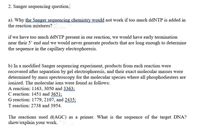
Biochemistry
9th Edition
ISBN: 9781319114671
Author: Lubert Stryer, Jeremy M. Berg, John L. Tymoczko, Gregory J. Gatto Jr.
Publisher: W. H. Freeman
expand_more
expand_more
format_list_bulleted
Question

Transcribed Image Text:2. Sanger sequencing question.
a). Why the Sanger sequencing chemistry would not work if too much ddNTP is added in
the reaction mixtures?
if we have too much ddNTP present in our reaction, we would have early termination
near their 5' end and we would never generate products that are long enough to determine
the sequence in the capillary electrophoresis.
b) In a modified Sanger sequencing experiment, products from each reaction were
recovered after separation by gel electrophoresis, and their exact molecular masses were
determined by mass spectroscopy for the molecular species where all phosphodiesters are
ionized. The molecular ions were found as follows:
A reaction: 1163, 3050 and 3363;
C reaction: 1451 and 3651;
G reaction: 1779, 2107, and 2435;
T reaction: 2738 and 3954.
The reactions used d(AGC) as a primer. What is the sequence of the target DNA?
show/explain your work.
Expert Solution
This question has been solved!
Explore an expertly crafted, step-by-step solution for a thorough understanding of key concepts.
This is a popular solution
Trending nowThis is a popular solution!
Step by stepSolved in 2 steps with 1 images

Knowledge Booster
Similar questions
- Hi, can you help me with this? Thank you. Please Note: This is only ONE problem set so according to the policy, all questions should be answered. I only need help with numbers 1,4,5,8,9,10,11,12arrow_forwardWhat factors could explain a transformation efficiency?arrow_forwardSelect all that apply from the following to each transformation process : The following are White non-glowing colonies White glowing colonies Blue non-glowing colonies Blue glowing colonies None of the above The transformation are: a. LB + kanamycin plates that have been spread with the E. coli cells transformed with your ligations, what phenotype of the colonies do you expect to obtain . b. LB + kanamycin plates that have been spread with the E. coli cells transformed with water, what phenotype of the colonies do you expect to obtain. c. LB plates that have been spread with the E. coli cells transformed with your pHSG298, what phenotype of the colonies do you expect to obtain. d. LB + kanamycin plates that have been spread with the E. coli cells transformed with PHSG298, what phenotype of the colonies do you expect to obtain. e. LB plates that have been spread with the E. coli cells transformed with your ligations, what phenotype of the colonies do you expect to obtain. f. LB plates…arrow_forward
- What is a protease enzyme? Why would we treat the strawberry extract with a protease in an extraction where the DNA needed to be subsequently analyzed?arrow_forward1) Provide a stepwise, arrow-pushing mechanism for the following transformation. You may use general acid and base as necessary. Feel free to abbreviate structures as needed. مسلسلند SCOA Lyase TPP mos مسلسلند H + H 요 SCOAarrow_forwardQuestion 8. You isolate the DNA from the bacterial cells and apply the Sanger dideoxy sequencing method. You then separate the products of the reactions by gel electrophoresis and obtain the following pattern. What is the sequence of the template and the DNA on the gel? ddATP ddTTP ddCTP ddGTP Template V [ Choose 3'-CTAGTCAAGG-5' 5'-CTAGTCAAGG-3' Sequence 3'-GATCAGTTCC-5' 5'-GATCAGTTCC-3' 5'-GGAACTGATC-3'arrow_forward
- The IAP kinetics assay was preformed at a basic pH. What does this tell you about the reaction environment ?arrow_forwardWhich of the following plates could represent the results of the transformation experiment with PGLO when plated on LB/Amp, if the experiment was successful? Refer to the letters on top of the image. Ignore the letters at the bottom. A B OB O none of the choices are correctarrow_forward
arrow_back_ios
arrow_forward_ios
Recommended textbooks for you
 BiochemistryBiochemistryISBN:9781319114671Author:Lubert Stryer, Jeremy M. Berg, John L. Tymoczko, Gregory J. Gatto Jr.Publisher:W. H. Freeman
BiochemistryBiochemistryISBN:9781319114671Author:Lubert Stryer, Jeremy M. Berg, John L. Tymoczko, Gregory J. Gatto Jr.Publisher:W. H. Freeman Lehninger Principles of BiochemistryBiochemistryISBN:9781464126116Author:David L. Nelson, Michael M. CoxPublisher:W. H. Freeman
Lehninger Principles of BiochemistryBiochemistryISBN:9781464126116Author:David L. Nelson, Michael M. CoxPublisher:W. H. Freeman Fundamentals of Biochemistry: Life at the Molecul...BiochemistryISBN:9781118918401Author:Donald Voet, Judith G. Voet, Charlotte W. PrattPublisher:WILEY
Fundamentals of Biochemistry: Life at the Molecul...BiochemistryISBN:9781118918401Author:Donald Voet, Judith G. Voet, Charlotte W. PrattPublisher:WILEY BiochemistryBiochemistryISBN:9781305961135Author:Mary K. Campbell, Shawn O. Farrell, Owen M. McDougalPublisher:Cengage Learning
BiochemistryBiochemistryISBN:9781305961135Author:Mary K. Campbell, Shawn O. Farrell, Owen M. McDougalPublisher:Cengage Learning BiochemistryBiochemistryISBN:9781305577206Author:Reginald H. Garrett, Charles M. GrishamPublisher:Cengage Learning
BiochemistryBiochemistryISBN:9781305577206Author:Reginald H. Garrett, Charles M. GrishamPublisher:Cengage Learning Fundamentals of General, Organic, and Biological ...BiochemistryISBN:9780134015187Author:John E. McMurry, David S. Ballantine, Carl A. Hoeger, Virginia E. PetersonPublisher:PEARSON
Fundamentals of General, Organic, and Biological ...BiochemistryISBN:9780134015187Author:John E. McMurry, David S. Ballantine, Carl A. Hoeger, Virginia E. PetersonPublisher:PEARSON

Biochemistry
Biochemistry
ISBN:9781319114671
Author:Lubert Stryer, Jeremy M. Berg, John L. Tymoczko, Gregory J. Gatto Jr.
Publisher:W. H. Freeman

Lehninger Principles of Biochemistry
Biochemistry
ISBN:9781464126116
Author:David L. Nelson, Michael M. Cox
Publisher:W. H. Freeman

Fundamentals of Biochemistry: Life at the Molecul...
Biochemistry
ISBN:9781118918401
Author:Donald Voet, Judith G. Voet, Charlotte W. Pratt
Publisher:WILEY

Biochemistry
Biochemistry
ISBN:9781305961135
Author:Mary K. Campbell, Shawn O. Farrell, Owen M. McDougal
Publisher:Cengage Learning

Biochemistry
Biochemistry
ISBN:9781305577206
Author:Reginald H. Garrett, Charles M. Grisham
Publisher:Cengage Learning

Fundamentals of General, Organic, and Biological ...
Biochemistry
ISBN:9780134015187
Author:John E. McMurry, David S. Ballantine, Carl A. Hoeger, Virginia E. Peterson
Publisher:PEARSON